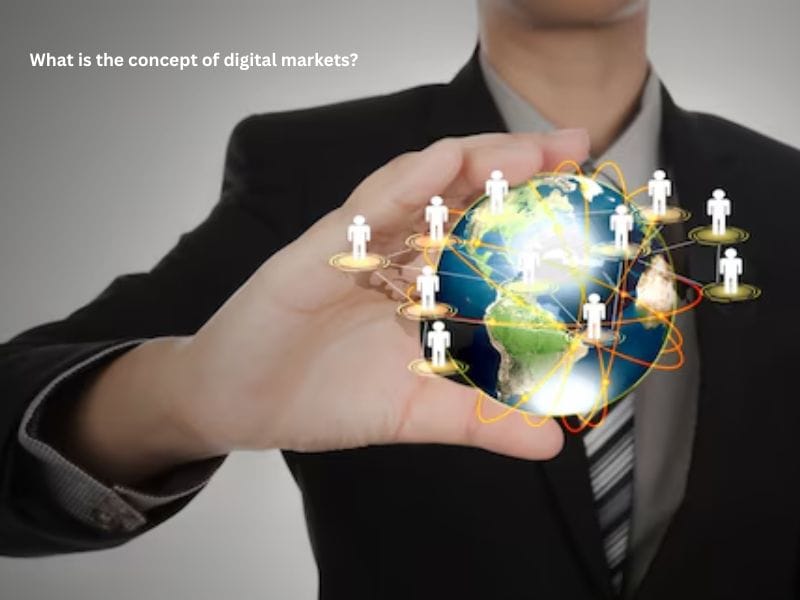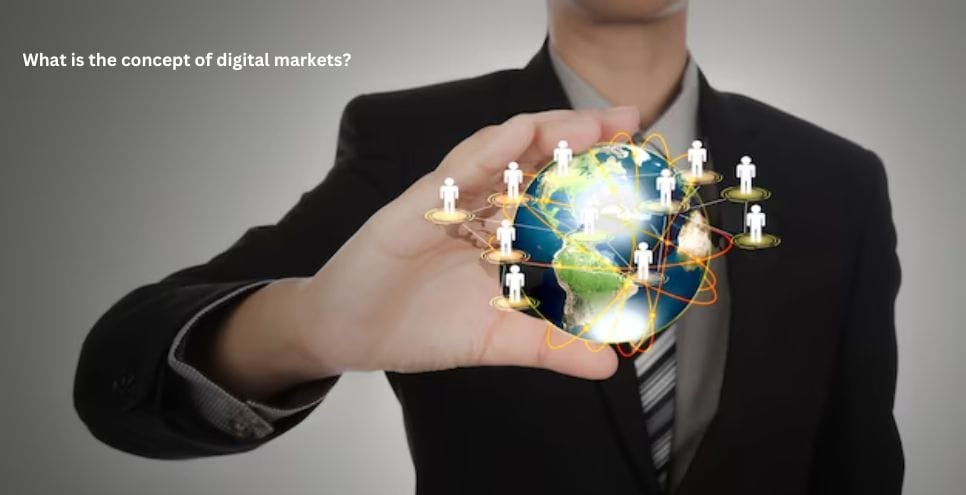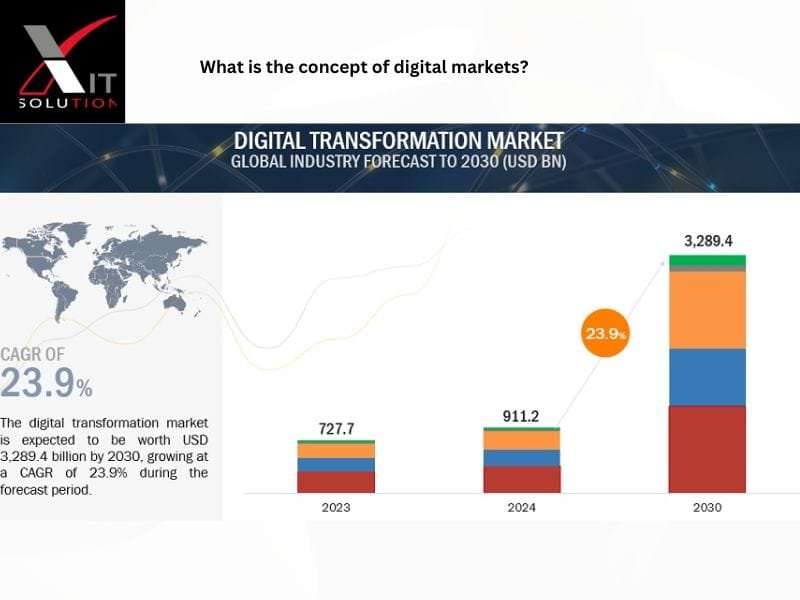What is the concept of digital markets?
What is the concept of digital markets? Learn the concept of digital markets, their role in global commerce, and why they’re transforming industries worldwide.
What is the concept of digital markets?
Digital markets have revolutionized the way businesses and consumers interact. These markets transcend geographical boundaries, offering unparalleled convenience, variety, and efficiency. From buying groceries to booking international flights, digital platforms are now the go-to solution for millions. But what exactly is the concept of digital markets, and why are they considered a cornerstone of modern commerce? This article explores their essence, evolution, and far-reaching impacts.
Digital markets are a revolutionary shift from traditional marketplaces, leveraging internet connectivity and advanced technology to facilitate seamless exchanges. These virtual spaces enable buyers and sellers to trade goods, services, or information effortlessly, bypassing geographical boundaries and offering global reach.
What is the concept of digital markets?
What Defines a Digital Market?
A digital market is a virtual ecosystem where transactions occur through digital platforms. Unlike traditional markets, digital markets are dynamic, heavily relying on technological innovation such as artificial intelligence (AI), big data, and cloud-based systems to ensure operational efficiency and user satisfaction.
Key features of a digital market include:
- Global Accessibility: Open 24/7 and accessible from anywhere.
- Data-Driven Operations: Leveraging analytics to understand trends and consumer behavior.
- Low Operational Costs: Reducing physical infrastructure needs.
What is the concept of digital markets?
Key Components of Digital Markets
- Users:
The heart of any digital market comprises buyers and sellers engaging actively to meet mutual demands. - Technology:
AI-powered recommendation systems, payment gateways like PayPal, and robust cloud-based infrastructure ensure efficient and secure transactions.
What is the concept of digital markets?
Historical Evolution of Digital Markets
Early Days of E-Commerce
The concept of digital markets began taking shape in the 1990s, driven by platforms like Amazon (established in 1994) and eBay (founded in 1995).
The Advent of Marketplaces
By the early 2010s, marketplaces became specialized. Platforms like Etsy catered to handcrafted and vintage goods, while Alibaba emerged as a global leader in wholesale trade. These platforms paved the way for niche digital markets.
What is the concept of digital markets?
Types of Digital Markets
B2B Digital Markets
Business-to-business markets, such as Alibaba and Salesforce, focus on facilitating transactions between companies. These platforms streamline supply chain management and enable bulk purchasing.
B2C Digital Markets
Business-to-consumer platforms like Amazon and Walmart offer direct sales to individuals.
C2C Platforms
Consumer-to-consumer platforms like eBay and Poshmark empower individuals to trade goods and services directly. These peer-to-peer networks foster community-driven commerce.
B2G Models
Business-to-government platforms, such as procurement systems, allow businesses to interact with public agencies efficiently, securing government contracts and tenders.
What is the concept of digital markets?
Benefits of Digital Markets
Accessibility and Convenience
Digital platforms operate round-the-clock, enabling users to conduct transactions regardless of time zones or physical location.
Enhanced Consumer Choices
Buyers can explore a vast array of products and services across multiple platforms, comparing prices, quality, and features effortlessly.
Efficient Resource Allocation
Advanced algorithms analyze supply and demand trends, optimizing inventory management and pricing strategies.
What is the concept of digital markets?
Global Statistics of Digital Markets
Growth Trends in E-Commerce
The e-commerce sector has witnessed exponential growth, with global sales projected to surpass $8.1 trillion by 2026 (Statista).
Internet Penetration Statistics
Approximately 63% of the global population now has internet access, a significant driver for the expansion of digital markets.
Digital Market Revenue Data
According to eMarketer, the digital advertising sector alone generated $616 billion globally in 2023, demonstrating the economic impact of digital markets.
What is the concept of digital markets?
Technological Foundations
Role of AI and Automation
AI optimizes personalization and decision-making in digital markets, enhancing user experiences.
Blockchain’s Role in Digital Markets
Blockchain ensures secure, transparent transactions, especially in industries like real estate and logistics.
What is the concept of digital markets?
Challenges in Digital Markets
- Privacy Concerns
Collecting vast amounts of consumer data raises ethical questions. - Cybersecurity Issues
Data breaches and hacking remain significant threats. - Trust and Credibility Challenges
Ensuring transparency in reviews and seller authenticity is critical.
What is the concept of digital markets?
Digital Markets vs. Traditional Markets
Key Differences
| Aspect | Digital Markets | Traditional Markets |
|---|---|---|
| Accessibility | Global and 24/7 | Limited by geography and hours |
| Cost Efficiency | Lower operational costs | Higher infrastructure costs |
| Data Insights | Advanced analytics available | Limited or no analytics |
Comparative Advantages
Digital markets surpass traditional ones in scalability, speed, and customer insights, making them indispensable in today’s interconnected world.
What is the concept of digital markets?
Impact of Digital Markets on Key Industries
Digital markets have become the backbone of numerous industries, revolutionizing traditional practices and enhancing efficiency. From retail to healthcare and financial services, these platforms are shaping consumer experiences and business operations.
What is the concept of digital markets?
Retail Sector
The retail sector has experienced a seismic shift with the advent of digital markets. Giants like Amazon, Walmart, and Alibaba have redefined how people shop, prioritizing customer convenience and operational efficiency.
E-Commerce Domination
Online platforms have emerged as dominant players in retail, enabling consumers to shop for products at the click of a button. In 2023, global e-commerce sales reached approximately $5.7 trillion, and this number is expected to grow as digital adoption increases.
Customer-Centric Approaches
Retail platforms leverage tools like artificial intelligence (AI) to:
- Offer personalized product recommendations.
- Predict shopping behavior based on past purchases.
- Optimize pricing strategies for better conversion rates.
Enhanced Supply Chain Efficiency
Digital markets optimize logistics and supply chains, ensuring faster deliveries and reduced operational costs. Services like Amazon Prime offer same-day delivery, setting new benchmarks in customer satisfaction.
What is the concept of digital markets?
Online Pharmacies
Platforms like GoodRx and Netmeds enable patients to order medications online, compare prices, and access discounts, reducing healthcare costs.
Telemedicine
Telemedicine platforms like Teladoc Health connect patients with doctors remotely, eliminating the need for physical visits. This innovation has proven crucial during the COVID-19 pandemic, with a significant rise in virtual consultations.
Wearable Technology
Devices like Fitbit and Apple Watch have integrated digital healthcare markets, offering real-time health monitoring and data collection for personalized care.
Global Reach
Digital markets also facilitate cross-border medical services, such as access to specialists and second opinions from international doctors, broadening healthcare options for patients.
What is the concept of digital markets?
Financial Services
The financial industry has undergone rapid digital transformation, driven by fintech platforms and digital payment solutions.
Payment Gateways
Platforms like PayPal, Stripe, and Square have revolutionized online payments, ensuring secure and fast transactions. They have empowered businesses to expand globally without traditional banking limitations.
Cost and Time Efficiency
Digital payment systems reduce transaction fees and time, allowing even small businesses to participate in global trade.
Financial Inclusion
Services like Venmo and Cash App democratize access to financial tools, providing underserved populations with secure methods to save, spend, and invest.
Blockchain and Cryptocurrency
Digital markets are also driving the adoption of blockchain-based currencies like Bitcoin and Ethereum, offering decentralized payment solutions that bypass traditional financial systems.
What is the concept of digital markets?
The Role of Data in Digital Markets
Data is the lifeblood of digital markets, driving insights and enabling businesses to refine their strategies.
Big Data Analytics
Data Collection and Analysis
Benefits for Sellers
- Tailored marketing campaigns based on user profiles.
- Inventory optimization to reduce overstock and meet demand efficiently.
- Improved product development through consumer feedback.
What is the concept of digital markets?
Consumer Behavior Insights
Trend Prediction
Analyzing consumer behavior helps platforms predict market trends, ensuring businesses stay competitive.
Personalized Experiences
Using AI, platforms deliver customized experiences, such as tailored advertisements, discounts, and product suggestions, enhancing user satisfaction.
What is the concept of digital markets?
Case Studies
Examining the success of industry leaders provides insight into the potential of digital markets.
Amazon’s Dominance
Customer-Centric Model
Amazon thrives by prioritizing customer needs, offering everything from groceries to entertainment through services like Amazon Prime Video.
Technological Innovations
The company leverages cutting-edge technologies like AI and robotics in its warehouses, ensuring operational efficiency.
Global Reach
Amazon operates in over 100 countries, using localized strategies to cater to diverse audiences.
Alibaba’s Global Strategy
Diverse Ecosystem
The platform combines wholesale (Alibaba.com), retail (Taobao), and financial services (Ant Group) to create a comprehensive digital market ecosystem.
What is the concept of digital markets?
Future of Digital Markets
The future of digital markets is poised for significant growth, underpinned by emerging technologies and changing consumer preferences.
Growth Predictions
Emerging Economies
Regions like Africa and Southeast Asia are experiencing rapid growth in digital market activities, thanks to improved connectivity and mobile device usage.
What is the concept of digital markets?
Integration with Emerging Technologies
5G Connectivity
The rollout of 5G networks promises faster and more reliable internet, enabling smoother digital transactions and enhanced user experiences.
Internet of Things (IoT)
IoT devices are expected to integrate with digital platforms, automating tasks like restocking groceries and scheduling appointments.
Augmented Reality (AR) and Virtual Reality (VR)
Technologies like AR and VR will redefine e-commerce by enabling virtual try-ons for clothing and immersive shopping experiences.
What is the concept of digital markets?
FAQs
How do digital markets benefit businesses?
They offer global reach, data-driven insights, and cost-efficiency compared to traditional markets.
What challenges do digital markets face?
Issues like data privacy, cybersecurity, and maintaining consumer trust are major hurdles.
Why are digital markets important in global commerce?
They enable seamless international trade, reduce costs, and improve accessibility.
How does technology influence digital markets?
Technologies like AI, blockchain, and big data analytics optimize operations and enhance user experiences.
What industries are most impacted by digital markets?
Retail, finance, and healthcare have undergone significant transformations due to digital platforms.
What is the concept of digital markets?
Conclusion
Digital markets are not just a trend but a transformative force reshaping global commerce. With rapid technological advancements, these platforms will only grow in influence, bridging gaps between businesses and consumers worldwide. For anyone seeking to thrive in the modern economy, understanding and leveraging digital markets is no longer optional—it’s essential.









